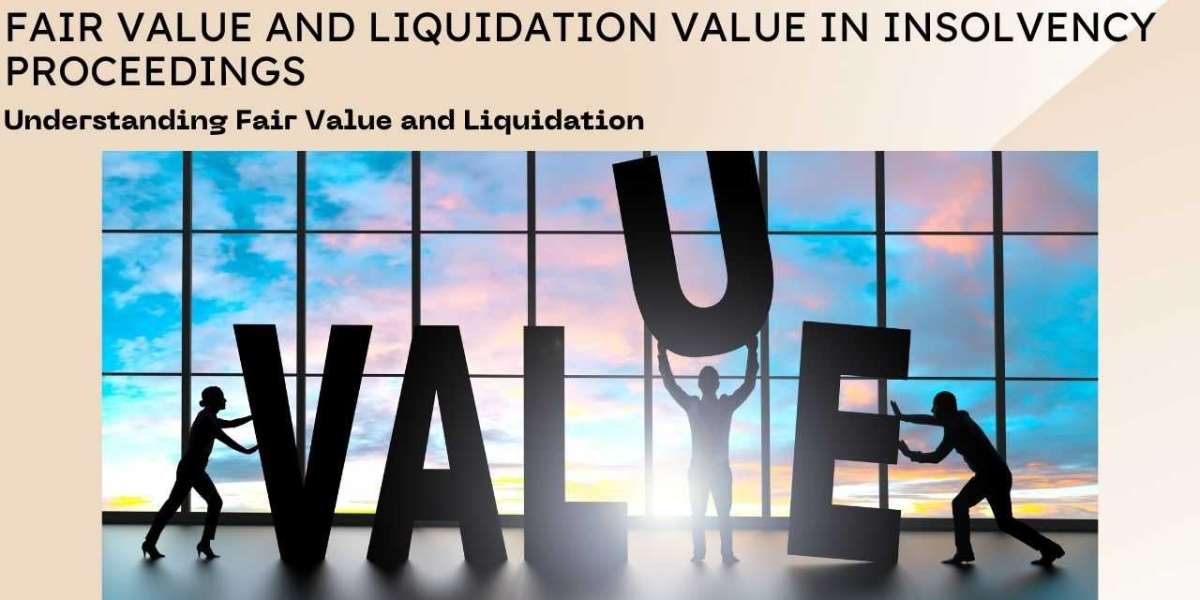In the complex world of insolvency proceedings, understanding asset valuation is crucial. Two key concepts often come into play are fair value and liquidation value. These valuations help determine the best course of action for a distressed company. This blog aims to shed light on these concepts and their significance under the Insolvency and Bankruptcy Code (IBC).
What is Fair Value?
Fair value is a measure used to determine the worth of an asset or company in normal market conditions. It reflects the price that would be received for an asset or paid to transfer a liability in an orderly transaction between market participants at the measurement date. Here are some key factors influencing fair value:
- Market Conditions: The current state of the market can significantly impact fair value. A booming market may increase asset values, while a downturn can lower them.
- Company’s Financial Health: The financial stability and performance of the company also affect fair value. A company with strong earnings and a robust financial position will generally have a higher fair value.
- Future Earning Potential: The ability of the company to generate future profits plays a crucial role. Higher expected earnings can elevate fair value.
In insolvency proceedings, fair value is used primarily for assessing the company's potential for recovery and guiding decisions about restructuring. It helps stakeholders understand the company's worth under normal circumstances, providing a basis for making informed decisions.
What is Liquidation Value?
Liquidation value refers to the estimated amount that can be realized from the sale of assets in a distressed situation. Unlike fair value, which assumes a regular market transaction, liquidation value is based on the assumption that assets must be sold quickly, often at a discount. Factors affecting liquidation value include:
- Urgency of Sale: Assets sold under urgent conditions may fetch lower prices. The more urgent the sale, the lower the liquidation value.
- Distressed Conditions: Assets sold in distressed conditions, where there is less time to find buyers or negotiate terms, will often have a reduced liquidation value.
- Marketability of Assets: The ease with which assets can be sold also impacts their liquidation value. Assets that are less marketable will have a lower liquidation value.
In insolvency proceedings, liquidation value is crucial for estimating the recovery amount available to creditors. It helps determine whether liquidation is more beneficial compared to restructuring.
The Role of IBC Valuation
IBC valuation plays a vital role in insolvency proceedings. It involves assessing both fair value and liquidation value to provide a comprehensive view of the company’s asset worth. Here’s how IBC valuation integrates these values:
- Process of Valuation under IBC: The IBC mandates a structured process for asset valuation, ensuring that both fair value and liquidation value are considered. This process helps in making balanced decisions about restructuring or liquidation.
- Impact on Insolvency Proceedings: Accurate IBC valuation is crucial for fair and transparent insolvency proceedings. It ensures that all stakeholders have a clear understanding of the company’s worth and the potential outcomes of different insolvency scenarios.
By incorporating both fair value and liquidation value, IBC valuation provides a complete picture of a company’s financial situation, helping to guide the insolvency process effectively.
Fair Value vs. Liquidation Value
While fair value and liquidation value are both important, they serve different purposes and have distinct implications:
- Purpose and Calculation: Fair value reflects the value of assets under normal market conditions, whereas liquidation value estimates the worth of assets under distressed conditions. The calculation of fair value generally involves future earning potential and market conditions, while liquidation value considers the urgency and marketability of assets.
- Implications for Stakeholders: For stakeholders, fair value provides insights into the company’s potential if it continues operations, while liquidation value shows what can be recovered in a sale. This comparison helps in deciding whether to pursue restructuring or liquidation.
Practical Examples:
- Scenario 1: Fair Value in Restructuring: Imagine a company with valuable intellectual property. If the market is strong, the fair value of these assets might be high, making restructuring a viable option.
- Scenario 2: Liquidation Value in Asset Sale: Conversely, if the same company is in distress and needs to sell quickly, the liquidation value of the intellectual property might be significantly lower. This scenario suggests that liquidation could be more practical than restructuring.
Challenges in Valuation
Determining fair value and liquidation value can be challenging due to several factors:
- Market Volatility: Fluctuations in the market can affect the accuracy of valuations. Both fair value and liquidation value need to be adjusted for current market conditions.
- Distressed Sales Conditions: The need for a quick sale can impact the liquidation value, making it difficult to get an accurate estimate.
- Complex Asset Valuation: Some assets are harder to value due to their unique nature or lack of market comparables.
To address these challenges, it’s essential to:
- Use Expert Valuations: Engaging experienced valuers can help ensure accurate and reliable valuations.
- Regular Updates: Keeping valuations updated with current market conditions and company performance is crucial.
Conclusion
Understanding fair value and liquidation value is essential for navigating insolvency proceedings. Both valuations provide critical insights into a company’s worth, guiding decisions on restructuring or liquidation. By accurately assessing these values, companies can make informed choices and better manage the insolvency process.
For a comprehensive IBC valuation and expert advice on managing insolvency, consider consulting with professionals who specialize in IBC valuation services. Their expertise can help ensure that your company’s assets are valued accurately, leading to a more effective resolution of insolvency proceedings.
By focusing on fair value and liquidation value, you can better protect your interests and make well-informed decisions during challenging financial times.
Also, read more about:- Legal Assistance for Insolvency and Bankruptcy Process








